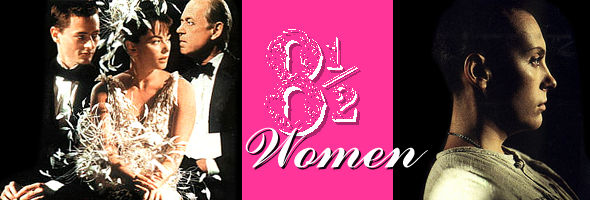

Color, 1999, 122m.
Directed by Peter Greenaway
Starring John Standing, Matthew Delamere, Toni Collette, Polly Walker, Amanda Plummer
Universal (US R1 NTSC) / WS (1.66:1) (16:9) / DD2.0
Continuing his pattern of alternating critically praised arthouse projects with alienating personal studies, the controversial Peter Greenaway followed his unexpectedly popular The Pillow Book with 8½ Women, a playful and thoroughly obscure compendium of art history fetishism, film history, and globe-hopping comic debauchery. The results pleased few, but Greenaway fanatics will find it more rewarding than newcomers despite its glaring flaws.
Following the death of his wife, Philip Emmenthal (John Standing) finds his structured world falling apart. He seeks solace in his Swiss estate with his son, Storey (Matthew Delamere), who runs a string of pachinko gambling parlors in Japan. After seeing Fellini's 8½ at a repertory theater, they devise a strange means of grief therapy and sexual release by turning the Swiss home into a brothel for one year. Between the two countries they recruit eight and a half highly unusual females for their experiment (and yes, the half woman is exactly what you think, as tasteless as that concept may sound). Among the women: Griselda (Toni Collette), a butch Swedish accountant who escapes conviction for embezzlement and takes up a fantasy existence as a nun; Beryl (Amanda Plummer), a horse enthusiast with a neck brace whose greatest love is her giant pet pig; Palmira (Polly Walker), an open society whore who gives her body to Philip but sparks anguished desire within Storey; and many others, including a compulsive Japanese gambler and an overly fertile Italian. Gradually the ongoing process of the life cycle decreases their number, and Philip and Storey find that escaping into fantasies can yield only temporary rewards.
In his original screenplay for this film, Greenaway assembled a wild concoction of homages to Fellini and Godard, with each women corresponding to both a Fellini film and a popular erotic trope in art history. This analogy is mostly scrapped in the film, which still includes portions of the screenplay itself as superimposed title cards but comes off as more disjointed and ultimately perplexing. Storey's bizarre ability to predict and even cause earthquakes results in a weak punchline, with the final tender moments of the story strangely muted and lacking in much emotional or aesthetic resonance. Most damningly, this film suffers even more than The Pillow Book or The Baby of Macon from the absence of composer Michael Nyman. If the two men can't patch things up, Greenaway needs to find another composer, and quickly, to fill the strange aural void left within his recent films. On the other hand, like other Greenaways, 8½ Women is often rapturously beautiful to watch, with Sacha Vierney's camerawork as steady and painterly as ever. Many of the comic scenes are unforgettable, with some especially funny banter between the father and son keeping things more lightweight than might be expected. Especially amusing are Collette's last few scenes, which are not easily forgotten. As with Prospero's Books, one can only wonder how on earth this film got away with an R rating considering the avalanche of nudity on display (including Plummer, alas), though the relative lack of actual sex scenes may be the reason.
Greenaway films depend heavily on a good presentation due to their meticulous visual arrangements, and the DVD of 8 1/2 Women looks particularly outstanding on video. The colors here are truly amazing to watch, particularly during the eye candy compositions of the pachinko scenes and a few of Greenaway's trademark pastoral landscape shots. A couple of zoom shots, particularly the very first image of the movie, reveal some visual limitations within the original film, but overall this looks better than the theatrical prints and benefits from a more generous 1.66:1 framing, with slight windowboxing on the sides during anamorphic playback. The surround audio is fine considering there isn't much going on, sonically speaking. The disc also includes the U.S. theatrical trailer in fullscreen, an appropriately bizarre and intriguing piece of promotion.
More Peter Greenaway Reviews:
The Draughtsman's Contract
A Zed and Two Noughts
The Belly of an Architect
Drowning by Numbers
The Cook, the Thief, His Wife and Her Lover
The Baby of Macon
The Pillow Book
The Tulse Luper Suitcases: The Moab Story
Nightwatching
The Early Films of Peter Greenaway